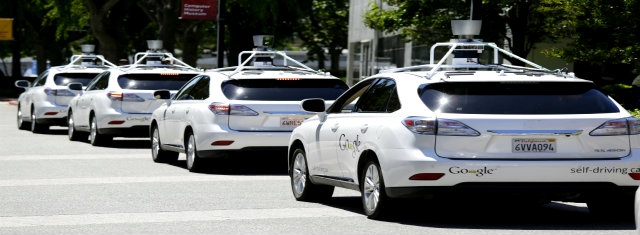Automobiles
Everyday driverless car trials
Four UK cities get green light

Google Driverless Car (Source: Internet)
USPA NEWS -
£10 million of funding from Innovate UK has given the green light for testing innovative driverless cars in the real world. Chancellor of the Exchequer George Osborne announced the funding today (Wednesday 3 December) as part of the government´s Autumn Financial Statement.
The following 4 cities will run formal trials that will last between 18 and 36 months from January 2015:
Greenwich, South East London
Milton Keynes and Coventry (working together as one project)
Bristol
Testing driverless cars in a real-world environment will help lead to greater levels of understanding of these vehicles. It will also allow the public to accept how the vehicles will fit into everyday life.
Greenwich, South East London
Milton Keynes and Coventry (working together as one project)
Bristol
Testing driverless cars in a real-world environment will help lead to greater levels of understanding of these vehicles. It will also allow the public to accept how the vehicles will fit into everyday life.
The funding comes through our competition, Introducing driverless cars to UK roads. The aim is to establish the UK as the global hub for the research, development and integration of driverless vehicles and associated technologies. Nick Jones, lead technologist for the low carbon vehicle innovation platform at Innovate UK, said: Cars that drive themselves would represent the most significant transformation in road travel since the introduction of the internal combustion engine and at Innovate UK, we want to help the UK to lead the world in making that happen.
There are so many new and exciting technologies that can come together to make driverless cars a reality, but it´s vital that trials are carried out safely, that the public have confidence in that technology and we learn everything we can through the trials so that legal, regulation and protection issues don´t get in the way in the future.
Greenwich, South East London -
The GATEway project is a model for potential implementation of automated transport systems in London, the UK and beyond. It´s led by the Transport Research Laboratory (TRL).
Greenwich, South East London -
The GATEway project is a model for potential implementation of automated transport systems in London, the UK and beyond. It´s led by the Transport Research Laboratory (TRL).
The project will create interoperable, scalable testing environments, protocols and standards guidance that will attract research and development investment.
Testing will include automated electric shuttle vehicles, M1 vehicles, a demonstration of tele-operated driving and a simulated 3D model of the Greenwich peninsula.
The project aims to leave the legacy of a driverless vehicle test environment in Greenwich, generating tangible business outcomes for consortium partners and attracting international manufacturers and associated industries to the UK.
Testing will include automated electric shuttle vehicles, M1 vehicles, a demonstration of tele-operated driving and a simulated 3D model of the Greenwich peninsula.
The project aims to leave the legacy of a driverless vehicle test environment in Greenwich, generating tangible business outcomes for consortium partners and attracting international manufacturers and associated industries to the UK.
Milton Keynes and Coventry -
The UK Autodrive programme will involve the demonstration of road-going cars and lightweight self-driving pods designed for pedestrianised spaces. It will be delivered on behalf of the UK by the City of Milton Keynes, working in association with the City of Coventry.
Other partners in the programme include JLR, Tata, Ford, RDM, Thales (UK), AXA, Wragge-Lawrence-Graham, Oxford University, Cambridge University, the Open University, and the new Transport Systems Catapult.
Consulting group Arup has devised the programme and will provide programme management and technical co-ordination skills.
The UK Autodrive programme will involve the demonstration of road-going cars and lightweight self-driving pods designed for pedestrianised spaces. It will be delivered on behalf of the UK by the City of Milton Keynes, working in association with the City of Coventry.
Other partners in the programme include JLR, Tata, Ford, RDM, Thales (UK), AXA, Wragge-Lawrence-Graham, Oxford University, Cambridge University, the Open University, and the new Transport Systems Catapult.
Consulting group Arup has devised the programme and will provide programme management and technical co-ordination skills.
Bristol -
The VENTURER consortium have joined forces to trial autonomous vehicles in Bristol. They will investigate the legal and insurance aspects of driverless cars and explore how the public react to such vehicles.
This programme aims to deepen understanding of the impact on road users and wider society and open up new opportunities for our economy and society.
The VENTURER consortium have joined forces to trial autonomous vehicles in Bristol. They will investigate the legal and insurance aspects of driverless cars and explore how the public react to such vehicles.
This programme aims to deepen understanding of the impact on road users and wider society and open up new opportunities for our economy and society.
Bristol has a long track record of technological innovation and offers a perfect location to test driverless cars. The city is built around hills, rivers, bridges and bends. This challenging terrain will provide important data that can be used to successfully introduce driverless cars in cities and towns across the UK to reduce congestion, improve air quality and use roads more efficiently and safely.
Source: Innovate UK, Gov.UK
Part of:Business and enterprise, Science and innovation, Transport and UK economy.
Source: Innovate UK, Gov.UK
Part of:Business and enterprise, Science and innovation, Transport and UK economy.
more information: https://www.gov.uk
Liability for this article lies with the author, who also holds the copyright. Editorial content from USPA may be quoted on other websites as long as the quote comprises no more than 5% of the entire text, is marked as such and the source is named (via hyperlink).





